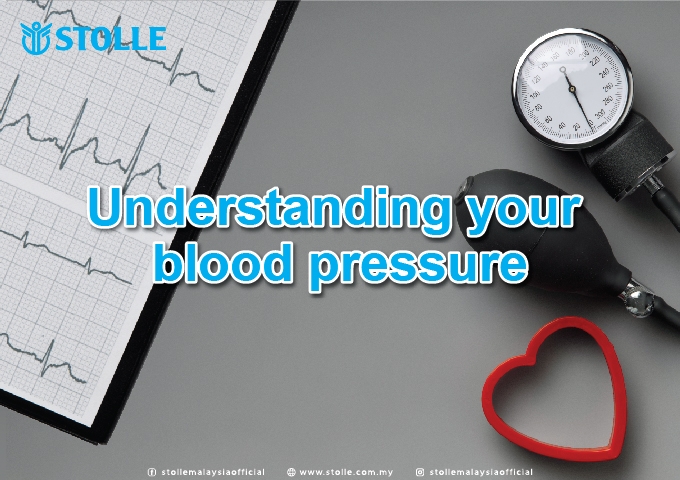Understanding your Blood Pressure Hypertension, commonly known as high blood pressure or "silent killer", is a prevalent chronic disease whose dangers are often overlooked. Not only does hypertension damage the cardiovascular system, but it can also trigger a range of severe health issues such as stroke, heart disease, and kidney failure. Therefore, understanding the risks of hypertension, early detection, and learning how to measure blood pressure correctly are crucial steps in maintaining vascular health. The Dangers of Hypertension The primary danger of hypertension is that it exerts excessive pressure on the blood vessel walls, especially at the branching points of the blood vessels. Over time, this high pressure can cause damage and hardening of the vessel walls, a condition known as arteriosclerosis. Arteriosclerosis reduces the elasticity of the blood vessels and damages the endothelial cells lining the vessel walls, leading to inflammation and the accumulation of fatty substances, which may ultimately form atherosclerotic plaques. These plaques can obstruct blood vessels and increase the risk of thrombosis, which can lead to stroke or myocardial infarction. Additionally, hypertension places a heavy burden on the heart, which can lead to heart failure over time. The damage hypertension causes to the kidneys is also significant, as high pressure can destroy the microvascular system of the kidneys, gradually leading to kidney failure. How to Measure Blood Pressure Correctly Accurate monitoring of blood pressure is key, and understanding the correct method to measure it is essential. Follow these recommendations to measure blood pressure properly: 1. Use a reliable and validated blood pressure monitor. 2. Measure your blood pressure twice daily, once in the morning and once before bed, and record the data for a week. 3. Avoid consuming caffeinated beverages, smoking, or engaging in vigorous exercise before measuring blood pressure. Rest quietly for at least 5 minutes before taking a reading. 4. Sit in a comfortable chair with your back straight and your feet flat. Place your arm on a table at the same level as your heart. 5. Wrap the blood pressure cuff around your upper arm, with the lower edge about 2-3 cm above your elbow. Ensure the cuff is snug but not too tight. 6. Start the blood pressure monitor, stay relaxed, and avoid talking or moving. Wait for the monitor to complete the measurement and record the reading. 7. To ensure accuracy, take two to three consecutive measurements and use the average value as the final result. Hypertension often presents no symptoms, making it a condition that requires long-term attention and management. By understanding the dangers of hypertension, adopting a healthy lifestyle, and regularly monitoring blood pressure, you can effectively prevent and control hypertension, thus protecting cardiovascular health. In addition to a healthy diet and appropriate exercise, consider incorporating a quality Stolle ImmNuPlus into your daily diet! After more than 60 years of research, 200+ patents to prove the product’s effectiveness, and 36 years of drinking surveys to prove the safety, Stolle ImmNuPlus is rich in immune nutrients, which can effectively assist in regulating immunity, reduce blood pressure and blood cholesterol level, as well as support gastrointestinal health. Stolle ImmNuPlus support immune balance and your heart health! Immune Today, Healthy Everyday!
more


What liver doing? The liver is one of the most vital and multifunctional organs in the human body. Located just below the ribcage on the right side, it performs a plethora of tasks that are essential for maintaining health. Let's dive into the intriguing world of the liver and explore its incredible functions!! The Liver's Role in Metabolism The liver plays a pivotal role in metabolism, the process by which our body converts food into energy. It is responsible for the metabolism of carbohydrates, proteins, and fats. Carbohydrate Metabolism: The liver helps maintain normal blood sugar levels by storing glucose as glycogen and releasing it when the body needs energy. Approximately 10% of the liver's weight is glycogen at any given time. Protein Metabolism: The liver synthesizes most of the body's proteins, including albumin and clotting factors. It processes amino acids and removes ammonia, a toxic byproduct, converting it to urea for excretion by the kidneys. Fat Metabolism: The liver produces bile, which is crucial for the digestion and absorption of fats. Each day, the liver secretes about 800 to 1,000 milliliters of bile. Detoxification Station One of the liver's most crucial functions is detoxification. It filters the blood, removing toxins, drugs, and other harmful substances. The liver processes about 1.4 liters of blood per minute, ensuring that our body stays clean and healthy. Alcohol Detoxification: The liver can metabolize about one standard drink (14 grams of pure alcohol) per hour. Chronic excessive drinking, however, can overwhelm this process and lead to liver damage. The Liver as a Storage Unit The liver stores essential vitamins and minerals, releasing them when the body needs them. Key stored substances include: Vitamins: The liver stores vitamins A, D, E, K, and B12. For instance, it can store up to a three-year supply of vitamin A. Iron: The liver stores iron as ferritin, which is crucial for red blood cell production. Immune Function The liver also plays a role in the immune system. It contains a large number of Kupffer cells, which are specialized macrophages that capture and digest bacteria, worn-out cells, and other debris from the blood. The Liver's Regenerative Power One of the most remarkable aspects of the liver is its ability to regenerate. Even if up to 75% of the liver is damaged or removed, it can regrow to its full size within months. This regenerative capacity is vital for liver transplant surgeries and recovery from liver injuries. Liver Health: Facts and Figures Maintaining liver health is crucial. Here are some key statistics related to liver health: Liver Disease: According to the World Health Organization (WHO), liver diseases, including hepatitis and cirrhosis, are among the top 10 causes of death globally. Fatty Liver Disease: Non-alcoholic fatty liver disease (NAFLD) affects about 25% of the global population, largely driven by rising obesity rates. Hepatitis: An estimated 325 million people worldwide live with chronic hepatitis B or C, both of which can lead to severe liver damage if untreated. Conclusion The liver is undoubtedly one of the most hardworking organs in the body. Its multifaceted roles in metabolism, detoxification, storage, immune function, and regeneration are vital for our overall health and well-being. By understanding the liver's functions and the importance of maintaining its health, we can appreciate this remarkable organ and take steps to protect it. Whether it's moderating alcohol consumption, maintaining a healthy diet, or getting regular check-ups, taking care of your liver is an investment in a healthier future.
more
Have You Chosen the Right Curcumin? Curcumin, the active compound in turmeric, has gained widespread attention for its potential health benefits. From anti-inflammatory properties to antioxidant effects, curcumin is celebrated as a natural remedy for various ailments. However, with the market flooded with different curcumin supplements, choosing the right one can be challenging. So, how do we know we are taking the right curcumin product? Understanding Curcumin Curcumin is a bright yellow compound found in turmeric, a spice commonly used in Indian cuisine and traditional medicine. It's known for its powerful anti-inflammatory and antioxidant properties. Research suggests that curcumin can help with conditions such as arthritis, heart disease, and even certain cancers. However, curcumin's natural bioavailability is quite low, meaning it is not easily absorbed by the body. This is where the choice of curcumin product becomes crucial. Factors to Consider When Choosing Curcumin Bioavailability: The effectiveness of curcumin largely depends on its ability to be absorbed by the body. Look for supplements that include ingredients designed to enhance bioavailability. Pairing curcumin products with piperine (found in black pepper) and fat (eg. Lecithin) can increase the product’s absorption. Quality and Purity: High-purity (>95%) curcumin ensures a higher intake of active ingredients, providing stronger anti-inflammatory, antioxidant, and other health benefits. Impurities or low-purity curcumin may weaken these effects, requiring higher doses to achieve the desired results. Formulation: Curcumin products come in various forms, including capsules, tablets, powders, and liquid extracts. Choose a formulation that suits your lifestyle and preferences. The powder or liquid forms of curcumin are typically purer, reducing the risk of ingesting unnecessary ingredients.Manufacturer Reputation: Potential Benefits of Curcumin Curcumin has been scientifically proven to offer a range of health benefits: Anti-inflammatory Effects: Curcumin helps reduce inflammation, which is a common factor in many chronic diseases. Antioxidant Properties: It helps neutralize free radicals, protecting cells from damage and slowing down aging. Liver Protection: Curcumin promotes liver cell regeneration and prevents fatty liver disease. Wound Healing: It promotes collagen synthesis, enhances skin regeneration, aids in wound healing, and reduces scar formation. Unique Four-Ingredient Formula of Vigor Plus for Your Health: High Purity Curcumin: Contains up to 95% pure curcumin, combined with soy lecithin and piperine to enhance bioavailability. Added Vitamins and Minerals: Includes vitamins A, E, and zinc to boost overall antioxidant capacity. Fiber for Detoxification: Added fiber to enhance detoxification capabilities. Natural Sweetener: Uses erythritol, a natural sugar substitute, to make the product taste more appealing. Add a packet of Kujuli Vitality Drink to your routine an hour after lunch to boost your vitality and promote a healthier lifestyle!
more
Eat Healthy During Pregnancy As the body of a pregnant woman changes, the nutritional needs during different stages of pregnancy also vary. A balanced diet is crucial during pregnancy, as it not only affects the mother's health but also directly impacts the growth and development of the fetus. Let's take a look at the nutritional needs during different stages of pregnancy and the foods that should be prioritized. First, regarding weight, how many kilograms should a pregnant woman gain? Pre-pregnancy Weight Status Body Mass Index (BMI) Recommended Weight Gain (kg) Underweight < 18.5 kg/m² 12.5 - 18.0 Normal weight 18.5 - 24.9 kg/m² 11.5 - 16.0 Overweight 25 - 29.9 kg/m² 7.0 - 11.5 Obese ≥ 30 kg/m² 5.0 - 9.0 Early Pregnancy (First 12 weeks): During early pregnancy, the baby's organs begin to form, so the mother needs to ensure adequate intake of essential nutrients, especially folic acid, vitamin B6, and vitamin B12. These nutrients are crucial for the development of the fetal nervous system. For example, folic acid intake can prevent neural tube defects in the fetus. Additionally, pregnant women need to ensure sufficient intake of protein, calcium, and iron to support the growth of the fetus and the mother's blood circulation. Mid-Pregnancy (13-26 weeks): The mid-pregnancy period is a time of rapid fetal growth, so the energy and nutritional needs of the mother increase. During this stage, pregnant women need to consume adequate amounts of protein, calcium, vitamin D, and folic acid to support the development of the fetal skeletal system, nervous system, and immune system. Moreover, they should monitor their weight gain to avoid excessive obesity, which could adversely affect both maternal and fetal health. Late Pregnancy (After 27 weeks): In late pregnancy, pregnant women require more energy and nutrients to support fetal growth and maintain their own health. At this time, the uterus becomes larger, putting pressure on the digestive organs, which may lead to indigestion and heartburn. Therefore, pregnant women should choose easily digestible foods and avoid overeating. Additionally, consuming sufficient fiber and water helps prevent constipation. The importance of diet during pregnancy cannot be overlooked. By maintaining a balanced and nutritious diet, pregnant women can ensure that both they and their babies receive adequate nutrition, promoting healthy fetal development and reducing the risk of various health issues for the mother. Furthermore, consider adding a cup of Stolle milk to your daily diet. Stolle ImmNuPlus and ImmNuPro contain high-quality proteins and patented immune nutrients, making it an excellent source of protein and calcium. It directly supports the immune system, reduces infections, enhances immunity, and achieves immune balance, keeping diseases at bay. If there are any questions regarding nutrition, pregnant women should consult a doctor or a nutritionist for professional advice.
more
Health Tips for Mother "Mom," besides bringing happiness and sweetness, also bears significant responsibilities. In fact, many mothers dedicate their love and energy to their families, often neglecting themselves. Let's explore what health tips mothers need at different stages this Mother's Day. From pregnancy to menopause, each stage presents different health challenges. Health Tips During Pregnancy: Pregnancy is a special stage in a woman's life, and a mother's health is closely related to the foetus’s growth. Therefore, pregnant women need to be careful about some health issues, including gestational diabetes, anaemia, and malnutrition. Balanced diet: Pregnancy diet should be balanced, including adequate vegetables, fruits, proteins, and carbohydrates. Avoid raw and cold foods like sashimi. Moderate exercise: Moderate exercise helps maintain physical health and mental well-being. You can choose suitable activities like prenatal yoga and prenatal fitness exercises. Regular check-ups: Regular prenatal check-ups are essential for timely detection and treatment of any health issues. Mental stress: You may experience mood swings, including anxiety and depression. Discussing with family and friends, maintaining a positive attitude, or exercising moderately can effectively reduce stress. Health Tips During Breastfeeding: Breastfeeding provides all the nutrients needed for a baby's healthy development and benefits the child's lifelong health. For mothers, breastfeeding can also reduce the risk of breast cancer, ovarian cancer, type 2 diabetes, and postpartum depression. Balanced diet: Extra nutrition is needed during breastfeeding, ensuring adequate intake of protein, calcium, and vitamins. Avoid excessive caffeine. Breastfeeding: Breastfeeding is the best choice, not only providing the necessary nutrition for the baby but also helping to establish an emotional bond between mother and child. Rest: Mothers during breastfeeding need sufficient rest, with a reasonable schedule allowing time to relax and recover. Health Tips During Menopause: Menopause is an important physiological turning point for women, usually occurring between the ages of 45 and 55. During this stage, women's bodies undergo a series of changes, accompanied by fluctuations in hormone levels, which may lead to some health issues such as diabetes, heart disease, and osteoporosis. Dietary attention: Menopausal women should focus on daily fat intake and increase dietary fibre and calcium intake to maintain bone health. Maintain exercise: Moderate aerobic exercise helps alleviate menopausal discomfort, improve cardiovascular function, and maintain body shape. Regular check-ups: Menopausal women should undergo regular gynaecological examinations, breast examinations, etc., to detect and treat gynaecological diseases on time. Whether it's pregnancy, breastfeeding, or menopause, mothers should pay attention to their health. You can ensure your health through a balanced diet, moderate exercise, and regular check-ups. Plus, don't forget to add Stolle Milk to your daily routine. Stolle ImmNuPlus and ImmNuPro contain rich, high-quality proteins and patented immune nutrients, serving as excellent protein & calcium sources and could support the immune system directly, reduce infections, activate immunity, achieve immune balance, and stay away from disease threats.
more
Nutrition needs For Children Malaysian children commonly face issues with being overweight, while a portion also faces malnutrition. Therefore, understanding the recommended nutritional intake for children can support their overall health, ensuring adequate growth and development, maintaining a robust immune system, and preventing serious illnesses. The required calorie intake for human growth and development comes from the diet, with the three major nutrients being protein, fat, and carbohydrates, constituting approximately 10-20%, 20-30%, and 50-60% respectively. Based on this, as children grow, their requirements vary slightly. Let's take a look at the nutritional needs of children at different age groups! Infants in the early stages of growth and development benefit most from breast milk, as it contains various nutrients and antibodies closely related to infant growth and development. As babies gradually increase their intake of solid foods, typically around 6 months, introducing some single-ingredient complementary foods becomes feasible. 1-3 years old: Toddlers Protein: Each meal for infants should provide sufficient protein to support their rapid growth and development. According to the Malaysian Ministry of Health (MOH), toddlers aged 1-3 years old need approximately 10 grams of protein per day. Fat: Fat serves as the primary energy source required for the brain and nervous system development in infants and toddlers. It also helps maintain skin health and cell membrane structure. Data shows that breast milk, with its higher fat content, provides essential fatty acids to promote infant nervous system development. Vitamin D: Vitamin D is crucial for bone health as it aids in calcium absorption and utilization. As per the MOH recommendation, toddlers aged 1 year and above require at least 15 µg of vitamin D daily to ensure normal bone and teeth development. Iron: Iron is a component of hemoglobin and essential for transporting oxygen throughout the body. According to MOH data, toddlers aged 1 year old need 9 milligrams of iron per day to support the development and function of their blood system. 3-6 years old: Preschoolers Children aged 3-6 years old are in a critical stage of growth and development, where a diverse and balanced diet ensures they receive all essential nutrients necessary for normal physical growth and development. Carbohydrates: Preschoolers are typically energetic, thus carbohydrates serve as their primary energy source. Insufficient carbohydrate supply can affect children's growth, development, and physical activity. Calcium: Calcium is a crucial nutrient for bone and teeth health. Data indicates that preschoolers aged 3-6 years old require approximately 700-1000 milligrams of calcium per day to support their bone growth and density. Vitamin A: Vitamin A is essential for vision development and immune system function. According to MOH, preschoolers aged 3-6 years old require approximately 400 micrograms of vitamin A daily to ensure healthy eyesight and immune system function. Dietary fiber: Dietary fiber aids in maintaining digestive system health and preventing constipation. MOH recommends preschoolers aged 3-6 years old to consume approximately 20-30 grams of dietary fiber daily to maintain intestinal health. 7-12 years old: School-aged children Children aged 7-12 years old are in a crucial stage of growth and development where they require various nutrients to support physical and brain development, as well as maintain their immune system and overall health. Protein: Protein is essential for supporting muscle and tissue growth as school-aged children's bodies continue to develop. Children aged 7-12 years old require approximately 23-30 grams of protein per day. Carbohydrates: Carbohydrates are the main source of energy for school-aged children, supporting their daily activities and learning. Children aged 7-12 years old should control their carbohydrate intake to between 45-65% of total energy. Iron: Iron is one of the key nutrients needed by school-aged children as it is essential for the formation of hemoglobin and oxygen transport. Data suggests that children aged 7-12 years old require approximately 10 milligrams of iron per day to maintain a healthy blood system. Vitamin C: Vitamin C supports immune system function and tissue health. WHO recommends school-aged children aged 7-12 years old to consume approximately 35-65 milligrams of vitamin C daily. Consider incorporating a glass of Stolle ImmNuPlus into children's daily diet (1 year old and above) , rich in milk nutrients, patented immune nutrients, and anti-inflammatory factors, directly supporting the immune system, reducing chronic inflammation, activating immunity, achieving immune balance, and guarding against disease threats.
more
Importance of Protein Do you know where the body's energy comes from? The three major nutrients for the body's energy include carbohydrates, proteins, and fats. Among these, protein is the fundamental component of body tissues and cells, crucial for maintaining overall health and normal functions. Therefore, ensuring an adequate intake of protein is essential for maintaining bodily health. Proteins play several crucial roles in the body, including: Building and Repairing Tissues: Proteins are the primary components of body tissues, including muscles, bones, skin, hair, and nails. In daily life, muscle tissues undergo continuous wear and tear, and proteins provide the necessary amino acids to facilitate tissue repair and regeneration. Supporting the Immune System: The immune system serves as the body's defense mechanism, protecting us from infections and diseases. Many immune cells and antibodies are composed of proteins, making protein crucial for maintaining a healthy immune system. Providing Energy and Metabolic Support: When there is inadequate energy supply from carbohydrates and fats, the body utilizes proteins for metabolism and converts them into energy. Participating in Enzyme and Hormone Synthesis: Many physiological processes require the involvement of enzymes to facilitate chemical reactions, and enzymes themselves are composed of proteins. Additionally, some hormones such as insulin and thyroid hormones are also proteins, regulating the body's metabolism and growth. Maintaining Healthy Cells and DNA Synthesis: The body's cells continuously divide and renew, with proteins serving as the foundation for cell structure and function. Furthermore, protein involvement is necessary for DNA synthesis to ensure the transmission and stability of genetic information. The body's protein requirements vary depending on factors such as age, gender, weight, physiological status, and activity levels. According to Malaysia's recommended nutrient intake, Malaysian adults require an average of 1 gram of protein per kilogram of body weight per day, accounting for 10-20% of total energy intake. Pregnant women, lactating mothers, athletes, and individuals with specific health conditions may require additional protein to meet their physiological needs. Sources of Protein Protein sources are diverse and can be classified as animal-based and plant-based sources. Animal-based protein primarily comes from meat, poultry, fish, dairy products, and eggs. These foods provide rich amino acids and are important sources of complete proteins required by the body. Plant-based protein mainly comes from legumes, soy products (such as tofu and soy milk), grains (such as rice, wheat, and corn), nuts, seeds, and vegetables. Although plant-based proteins typically lack a complete amino acid profile, a varied diet and combination of plant proteins can still meet the body's protein requirements. In daily life, choosing healthy protein sources is crucial. It is recommended to prioritize lean protein sources low in fat and cholesterol, such as fish, skinless chicken, legumes, and low-fat dairy products, to avoid excessive intake of saturated fats and cholesterol, which helps maintain cardiovascular health. Additionally, reducing the intake of processed meats and meat products is advisable, as these foods often contain high levels of fat, cholesterol, and additives, which are detrimental to health. Protein is an essential nutrient for the body, crucial for maintaining bodily health and normal functions. By choosing diverse sources of protein and ensuring adequate intake, one can help meet the body's protein needs and promote a healthy lifestyle. Stolle ImmNuPlus and ImmNuPro contain rich, high-quality proteins and patented immune nutrients, serving as excellent protein sources and able to support the immune system directly, reduce infections, activate immunity, achieve immune balance, and stay away from disease threats.
more
Understanding HDL and LDL Cholesterol is a type of lipid that is crucial for normal bodily functions, including cell structure and function, hormone synthesis, and bile acid synthesis. Despite its importance in maintaining normal physiological functions, elevated levels of cholesterol are closely associated with the risk of cardiovascular disease. Therefore, it is essential to understand the types of cholesterol, and distinguish between good and bad cholesterol. Cholesterol is mainly divided into two types: low-density lipoprotein (LDL) and high-density lipoprotein (HDL). LDL is referred to as "bad" cholesterol because it deposits on the walls of blood vessels, forming arterial plaques, and increasing the risk of heart disease and stroke. In contrast, HDL is known as "good" cholesterol because it helps clear LDL from the blood vessels and transports it to the liver for processing, thereby reducing the risk of cardiovascular disease. So, what are the food sources of these types of cholesterol? Food sources of bad cholesterol (low-density lipoprotein, LDL): High saturated fat foods: including red meat, butter, cheese, etc., which contain high levels of saturated fatty acids Processed foods: Processed meats, fast food, pastries, etc., typically contain high levels of saturated fat and trans fat Sugar and sugary products Alcohol Food sources of good cholesterol (high-density lipoprotein, HDL): Olive oil: Olive oil is rich in monounsaturated fatty acids Fish: Fish rich in omega-3 fatty acids, such as salmon, cod, and trout Nuts: Nutrient-rich foods such as almonds, walnuts, and peanuts are rich in healthy fats and fiber Avocado: Avocado contains abundant monounsaturated fatty acids Preventing high cholesterol is key to adopting healthy lifestyles and dietary habits. Here are some preventive measures: Maintain a healthy diet: Choose low-cholesterol foods such as fruits, vegetables, whole grains, lean meats, and fish. Avoid high cholesterol and saturated fat foods such as red meat, cheese, and butter. Control weight: Obesity is one of the major risk factors for high cholesterol. Control weight through a balanced diet and moderate exercise. Exercise regularly: Engage in moderate aerobic exercises such as brisk walking, jogging, swimming, or cycling to increase HDL levels and lower LDL levels. Quit smoking: Smoking reduces HDL levels and increases the risk of cardiovascular disease. Therefore, quitting smoking is one of the important steps in preventing high cholesterol. Limit alcohol consumption: Excessive alcohol consumption increases weight and cholesterol levels, so alcohol intake should be limited. Add a sachet of ImmNuPlus daily: Patented bioactive factors such as specific IgG, secretory IgA, lactoferrin and anti-inflammatory factors directly support the immune system by balancing immune responses and reducing cholesterol and blood pressure.
more
Obesity is a chronic disease Obesity is not just an aesthetic issue but a serious chronic disease nowadays. Without causing any physical discomfort, obesity silently affects the functioning of internal organs, leading to various complications that threaten the health of a significant portion of the global population. According to the World Health Organization (WHO), over a billion people worldwide are identified as overweight, with at least three hundred million classified as obese. In Malaysia, half of the adult population faces weight issues and obesity as well as children. This constitutes a global public health challenge, with an underlying cascade of obesity-related chronic diseases, including diabetes, cardiovascular diseases, and hypertension. Research indicates that fat cells are not just storage depots for energy; they are active endocrine organs that secrete a range of hormones and bioactive substances. Imbalances secretion of these substances can lead to insulin resistance that triggers diabetes. Furthermore, obesity is closely linked to chronic inflammatory processes which increase the risks of cardiovascular diseases and certain cancers. Cardiovascular diseases are closely associated with obesity. The accumulation of excess fat, especially abdominal fat, increases the risk of heart disease and stroke. Data suggests that the risk of heart disease in obese individuals is more than twice that of those with normal weight. For every 0.1 increase in the waist-to-hip ratio, the risk of premature death increases by 34% for men and 23% for women. Moreover, high blood pressure is another chronic disease closely linked to obesity. Multiple studies show that being overweight puts extra burden on the heart, making high blood pressure the norm. The risk of hypertension in obese individuals is significantly higher than in those with normal weight, providing a robust foundation for considering obesity as a chronic disease. Today, let's embark on a healthy weight loss journey together with Stolle. During the weight loss process, insufficient intake of protein can lead to a decrease in immunoglobulins, causing a decline in immunity. Therefore, it's crucial to ensure an adequate daily intake of protein. Drinking Stolle ImmuNuPlus daily not only provides high-quality protein and the unique nutrients inherent in milk but also includes special immune protein spheres as natural antibodies, directly supporting the body's immune system. You can also complement it with Stolle Vigor Plus, a product primarily composed of turmeric. In recent years, numerous studies have discovered that curcumin, a compound in turmeric, possesses antioxidant and anti-inflammatory properties, and even promotes fat metabolism. Moderately extracting curcumin can help with blood circulation, boost metabolism, aid in generating body heat during exercise, and enhance fat-burning efficiency. Vigor Plus is formulated with highly pure curcumin extract, coupled with dual absorption factors and a unique golden formula conforming to antioxidants, accelerating metabolism, and actively eliminating waste from the body. Preventing obesity is not just about having a better appearance but also about steering clear of the threats posed by numerous chronic diseases, welcoming a healthier and more fulfilling life.
more







